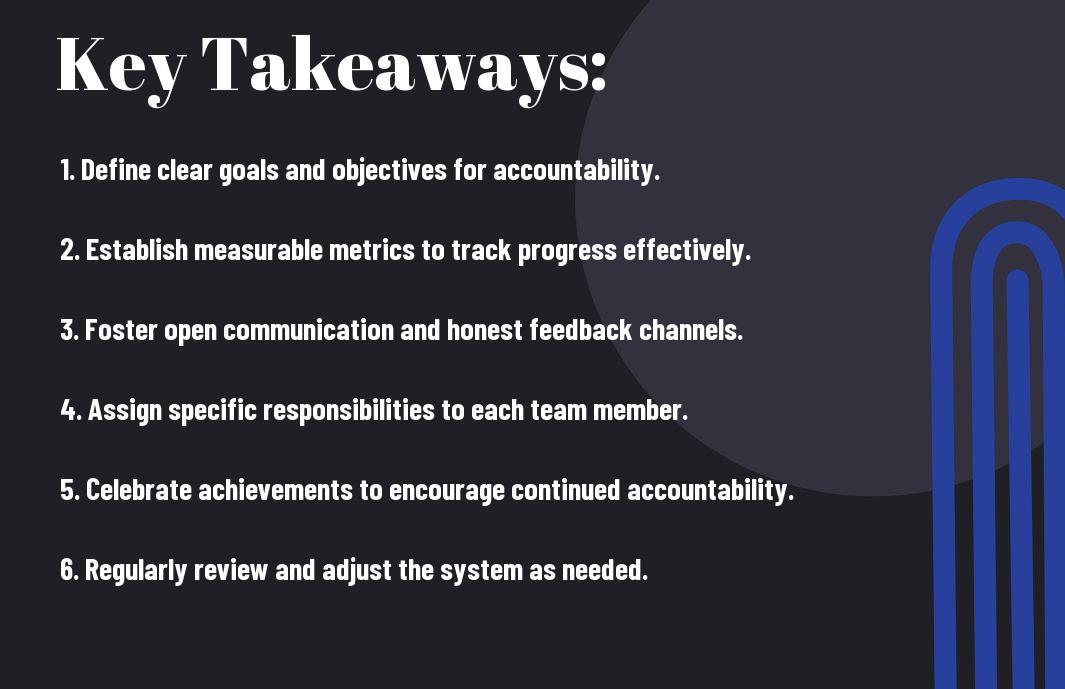There’s a powerful strategy that can significantly enhance your productivity and personal growth: an accountability system. By implementing structured methods to hold yourself accountable, you can increase your commitment to goals and make substantial progress in your endeavors. In this post, you’ll discover effective techniques to create a tailored accountability system that works for you, allowing you to stay focused and motivated while tracking your progress. Whether you’re pursuing personal or professional objectives, establishing this system will empower you to achieve your desired outcomes more efficiently.

Key Takeaways:
- Define Roles: Clearly outline responsibilities for each team member to promote ownership.
- Set Clear Goals: Establish specific, measurable objectives to guide performance and track progress.
- Regular Check-ins: Schedule consistent meetings to review outcomes and address challenges collaboratively.
- Transparent Communication: Foster an environment where team members feel comfortable sharing updates and concerns.
- Feedback Mechanism: Implement a structured process for giving and receiving constructive feedback.
- Celebrate Success: Recognize and reward individual and team achievements to maintain motivation and commitment.
- Continuous Improvement: Encourage ongoing learning and adaptation to refine the accountability system over time.
Understanding Accountability
Before you can build an effective accountability system, it’s imperative to understand the foundation of what accountability truly means. Accountability is not just about responsibility; it involves taking ownership of your actions, decisions, and their outcomes. This understanding will guide you in fostering an environment where accountability thrives, ultimately enhancing performance and collaboration.
Definition of Accountability
Along with being responsible for your duties, accountability involves transparency and a willingness to answer for one’s actions. It creates a framework where you can reflect on and evaluate your performance, encouraging personal and professional growth.
Importance of Accountability in Organizations
Importance of accountability in organizations cannot be overstated. When you embrace accountability, you enhance trust and teamwork, which leads to higher productivity. Each member of your organization becomes more engaged, knowing their contributions are recognized and valued.
Plus, fostering an accountable culture directly impacts your organization’s success. When you and your team hold yourselves accountable, it encourages open communication and constructive feedback. This not only improves individual performance but also aligns everyone towards common goals, ultimately driving better results and a stronger organizational culture.


Components of an Effective Accountability System
Some of the key components of an effective accountability system include clear goals, defined roles, and a robust feedback mechanism. By implementing these elements, you can foster an environment of accountability that encourages ownership and enhances performance. For more insights, check out 5 Top Tips for developing a system of accountability.
Clear Goals and Objectives
After establishing an accountability system, your first step should be to set clear goals and objectives. This clarity helps you and your team understand what success looks like and aligns everyone’s efforts towards common outcomes.
Roles and Responsibilities
Above all, defining roles and responsibilities is vital for a successful accountability system. When each individual knows their specific tasks and the expectations surrounding them, you create a framework that supports accountability and encourages collaboration.
Roles within your accountability system need to be well-articulated to promote transparency. Clearly outline who is responsible for what, ensuring that everyone understands their contributions to the overall goals. By doing so, you cultivate ownership and enhance team dynamics, ultimately driving increased engagement and productivity.
Establishing Accountability Frameworks
After laying the groundwork for your accountability system, you’ll need to establish frameworks that clearly define roles and responsibilities. This structure helps ensure that everyone understands their contributions to the team’s success. For more insights, you can explore Building a Culture of Accountability: The Role …. By creating a transparent and communicative environment, you can foster a culture where accountability thrives.
Policies and Procedures
For effective accountability, you should establish clear policies and procedures that outline expectations and define the consequences for actions. This framework not only guides behavior but also provides a reference point for resolving disputes and evaluating performance. When everyone adheres to these standards, you’ll notice increased productivity and harmony within your team.
Tools and Resources for Implementation
Accountability can be enhanced through various tools and resources designed to assist you in tracking performance and ensuring compliance with established procedures. These can include software solutions that facilitate goal setting, progress monitoring, and feedback mechanisms. By integrating these tools into your everyday processes, you empower your team to take ownership and stay aligned with organizational objectives.
And, as you implement these tools, consider providing your team with training and support to maximize their effectiveness. This could involve workshops on using specific software or regular check-ins to discuss progress and challenges. By equipping your team with the right resources, you not only streamline their accountability but also promote an ongoing culture of learning and improvement within your organization.

Measuring Accountability
Not all accountability systems are created equal. To effectively gauge progress and ensure responsibilities are met, you must establish a reliable framework for measurement. This involves setting clear standards and tracking them consistently to cultivate a culture of accountability within your organization.
Key Performance Indicators (KPIs)
KPIs are crucial tools that help you quantify success and monitor your accountability efforts. These specific metrics allow you to assess how well your team is performing against predetermined goals, providing insights that drive improvements and keep everyone aligned with your objectives.
Evaluation Methodologies
Indicators used in evaluation methodologies provide context and depth to your measurement process. By incorporating both qualitative and quantitative measures, you can gain a comprehensive understanding of performance. Techniques such as surveys, performance reviews, and regular check-ins can offer valuable feedback, enabling you to make informed decisions about future strategies.
Further refining your evaluation methodologies ensures that you are not only measuring outcomes but also understanding the reasons behind them. Engaging with team members during evaluations can uncover insights that numbers alone may not reveal. By combining feedback and data analysis, you can pinpoint areas for growth and celebrate successes, fostering an environment where accountability thrives.
Overcoming Barriers to Accountability
All too often, individuals and organizations struggle with accountability due to various obstacles that hinder progress. Recognizing these barriers is the first step toward building a robust Building a Culture of Accountability. Understanding what stands in your way can empower you to take proactive measures for change.
Common Challenges
Common challenges include fear of confrontation, unclear expectations, and a lack of trust among team members. These issues can create an environment where accountability is seen as a threat rather than an opportunity for growth. Identifying these barriers allows you to address them effectively.
Strategies for Improvement
An effective approach to overcoming accountability barriers involves fostering open communication, setting clear expectations, and creating a supportive atmosphere. Establishing a culture where feedback is welcomed encourages accountability to thrive.
Accountability can be enhanced by implementing regular check-ins and transparent goal-setting processes. By encouraging dialogue about responsibilities and outcomes, you promote ownership of tasks within your team. Celebrate successes and analyze setbacks together to build trust and commitment, transforming accountability from a burden into a shared value.
Fostering a Culture of Accountability
For any organization to thrive, fostering a culture of accountability is vital. This environment encourages individuals to take ownership of their actions, leading to improved performance and collaboration. By empowering your team to embrace accountability, you create a foundation where everyone feels responsible for their contributions, ultimately driving the success of your organization.
Leadership’s Role
Culture starts from the top down, and your leadership plays a fundamental role in shaping it. When you model accountability through transparent decision-making and clear communication, you set the standard for your team. By consistently demonstrating commitment to accountability, you inspire others to mirror these behaviors, creating a unified organizational ethos.
Employee Engagement
Along with strong leadership, employee engagement is key to fostering a culture of accountability. When your team feels connected to your organization’s goals, they are more likely to take ownership of their responsibilities and strive for success. Engaged employees are proactive in their roles, driving innovation and productivity.
And, enhancing employee engagement goes beyond meetings and performance reviews. You can foster engagement by soliciting feedback, recognizing individual achievements, and cultivating strong interpersonal relationships within your team. When you actively involve your employees in decision-making processes and create opportunities for personal development, you empower them to take accountability not only for their tasks but also for the overall mission of your organization. This sense of belonging and responsibility naturally leads to higher performance and morale.
Final Words
So, building an accountability system is necessary for maintaining focus and achieving your goals. By clearly defining your objectives, regularly tracking your progress, and fostering a supportive environment, you can enhance your commitment to success. Embrace tools like progress charts, accountability partners, or digital platforms to ensure you remain on track. Ultimately, investing time in this process not only strengthens your resolve but also empowers you to realize your potential and reach new heights in your personal and professional life.
FAQ about Building an Accountability System
Q: What is an accountability system?
A: An accountability system is a structured approach that helps individuals or teams take responsibility for their actions, track progress, set goals, and achieve desired outcomes. It typically involves setting clear expectations, monitoring performance, and providing feedback to ensure tasks are completed effectively.
Q: Why is building an accountability system important?
A: Establishing an accountability system fosters a culture of responsibility and encourages individuals to commit to their tasks. It enhances productivity, boosts morale, and contributes to achieving personal and organizational goals. Additionally, it helps identify obstacles early, enabling timely intervention and support.
Q: What are the key components of an effective accountability system?
A: An effective accountability system usually includes clear goal setting, regular progress reviews, defined roles and responsibilities, tools for tracking progress, and methods for giving and receiving feedback. Additionally, establishing a supportive environment that encourages open communication is also fundamental.
Q: How can I set up an accountability system within my team?
A: To establish an accountability system in your team, start by defining team goals and individual responsibilities. Utilize tools for tracking progress, such as project management software or shared documents. Schedule regular check-ins to discuss progress and address challenges. Lastly, create a feedback loop to support continuous improvement.
Q: What tools can help me build an accountability system?
A: Various tools can facilitate the building of an accountability system, including project management software like Trello or Asana, communication platforms such as Slack or Microsoft Teams, and performance tracking tools like Google Sheets or specialized apps. The choice of tools may depend on team size and specific needs.
Q: How can I ensure team members feel comfortable taking accountability?
A: Creating a supportive atmosphere is necessary for encouraging accountability. Foster open communication, recognize achievements, and provide constructive feedback. Encourage team members to express concerns and share challenges without fear of negative repercussions. This helps build trust and a shared commitment to accountability.
Q: What should I do if someone in the accountability system is not meeting expectations?
A: If a team member is not meeting expectations, initiate a one-on-one conversation to understand the underlying issues. Offer support and resources to help them succeed. Revisit set goals and adjust if necessary, while emphasizing the importance of accountability. If challenges persist, further action may include additional training or, in some cases, reassignment.




